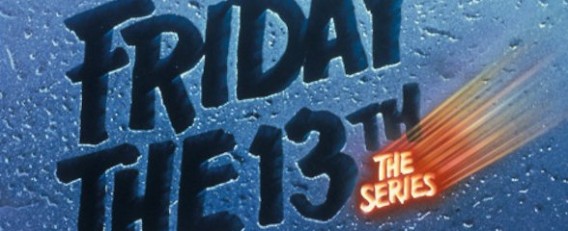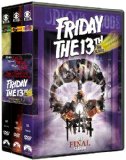Friday the 13th: The TV Series (1987) Retrospective

With the latest installment, 1986′s Friday the 13th Part VI: Jason Lives, earning almost $2m less than its predecessor at the US box office, despite fairing better with both fans and critics, Paramount were unsure on how to proceed with their long-running franchise. All attempts to move their highly anticipated Nightmare on Elm Street crossover Freddy vs. Jason into production had failed and nervous executives were desperate to save their fledging product. Paramount began to express interest in moving two of their most successful commodities into the world of television syndication, namely Star Trek - which had first begun as a TV show in the 1960s, before being launched as a successful movie franchise in 1979 - and Friday the 13th. Both titles alone would be familiar to the public and would generate a certain level of interest, although the latter also ran the risk of attracting controversy.
It had been over six years since the studio had first purchased Sean S. Cunningham’s low budget thriller Friday the 13th and since then the series that it had spawned had earned in excess of $170m, yet the negative criticism that Paramount had received from both moral watchdogs and film critics had been a constant thorn in their side. Frank Mancuso Jr. had begun to distance himself from the Friday the 13th franchise as early as 1984, following the success of the supposedly last installment The Final Chapter. He had continued to oversee the production of the next two sequels but had remained distant, allowing the filmmakers a certain amount of creative freedom whilst he focused on his own projects. But some time after the release of Jason Lives, Mancuso Jr. was contacted by Paramount Television’s Mel Harris, who expressed interest in transporting the Friday the 13th brand to the small screen.
Harris had first joined the studio in 1977 and was promoted to Vice President of Program Marketing, as well as president of Paramount Video in the mid-1980s. He would become a pioneer in television syndication and would be responsible for allowing Gene Roddenberry to resurrect his TV career with Star Trek: The Next Generation, which would ultimately run for a total of seven years. Harris requested that Mancuso Jr. be in charge of adapting Friday the 13th into a television series but advised that it should have no direct relation to the movie franchise and should not feature any references to Jason Voorhees or Camp Crystal Lake. Mancuso Jr. was hesitant about producing a television show called Friday the 13th that did not feature Jason, as he feared that the fan base would be disappointed and that the ratings would suffer. Harris did advise the young producer, however, that he had creative freedom to conceive whatever kind of show he wanted, thus allowing Mancuso Jr. the opportunity to create a series of bizarre stories loosely connected by a continuing narrative.
Mancuso Jr. would be introduced to a budding young writer called Larry B. Williams, who had previously worked on the family-friendly science fiction romp SpaceCamp. There was only the title, Friday the 13th, and Mancuso Jr. had neither a concept nor a clear idea of what kind of show he wanted to produce. Brainstorming with Williams, a story began to take form which revolved around an antique store in New Orleans called Curious Gifts, whose owner was struggling to make a profit and reluctantly sold his soul to the Devil in return for success. Echoing the tale of Faust, as well as the urban legend of blues guitarist Robert Johnson, the man began to receive great wealth from his deal with the Devil, although his eventual defiance would cost him his life. The store would then be taken over by his niece and her cousin, who begin to sell off many of the cursed items before being warned by a mysterious stranger of the evil that they had unleashed upon the world.
Despite an enthusiasm for the story, Mancuso Jr. was still reluctant to refer to the show as Friday the 13th and instead approached the studio with the suggestion of calling it The 13th Hour, but Harris and his producers insisted that the Friday the 13th connection remain for marketing purposes. Mancuso Jr. even tried to use the results gathered from a focus group survey, which stated that the majority of viewers would be put off by a show entitled Friday the 13th, to convince his superiors but once again he was unsuccessful. With a basic concept in place, Williams wrote a short pilot that they intended to screen to the studio in order to show what they intended to do, which Mancuso Jr. would direct. With the pilot in hand, Friday the 13th was pre-sold along with Star Trek: The Next Generation at NATPE, a body which allows companies to create or distribute their products. Mancuso Jr. then began to conceive various different story lines that Williams and a series of guest writers could adapt into screenplays. Amongst those who would contribute scripts were Rob Hedden, who would later become known to fans of the franchise as the director of 1989′s Friday the 13th Part VIII: Jason Takes Manhattan.
The principal roles for Friday the 13th: The Series were Micki Foster and Ryan Dallion, both of whom take over Curious Gifts when Micki’s uncle, Lewis Vendredi, suddenly passes away. Born and raised in Saint Paul, Minnesota, James LeMay later studied at the Illinois State University in Chicago, before going onto an internship at the Geffen Theatre. His agent had prompted the young actor to relocate to Los Angeles in order to find more substantial roles and soon he was landing parts in commercials and television shows such as Facts of Life and The Twilight Zone. After losing out on the 1985 horror comedy Once Bitten to a pre-fame Jim Carrey, LeMay auditioned for the role of Ryan in Friday the 13th: The Series. His co-star, Louise Robey, was born in Montreal, Quebec and was two years older than LeMay. The daughter of stage actress, Robey had pursued a singing career in Paris, where she would also enjoy modest success as a model. Following minor roles in the Tom Hanks comedy The Money Pit and the Arnold Schwarzenegger thriller Raw Deal, Robey was cast as Micki.
Another significant character was that of Jack Marshak, a friend of Micki’s uncle who had come to warn the two of the curse that surrounded the items they were selling. Taking the role of Jack was Chris Wiggins, who was born in Blackpool, England but had relocated to Canada in 1952 to work for a newspaper, before turning his attention to theatre. Making the transition to television in the late 1950s, Wiggins would work predominantly on the small screen throughout his career, which would also include the animated Star Wars spinoff Droids. In the role of Lewis was R. G. Armstrong, a veteran of countless television westerns from the 1950s and 1960s, including Have Gun–Will Travel and Maverick, whilst also making appearances in The Twilight Zone, Alfred Hitchcock Presents and The Fugitive. With each episode focusing on a different story, Friday the 13th: The Series would feature a diverse supporting cast of unknown actors, such as Sarah Polley (who would later star in the 2026 remake of Dawn of the Dead), Carolyn Dunn and Barclay Hope (both would appear in Paramount’s small screen spinoff of War of the Worlds the following year) and Scott Paulin (who had previously appeared in Paul Schrader’s 1982 remake of Cat People).
Filming on Friday the 13th: The Series took place in Toronto, Canada, which had become a popular location for American filmmakers due to the low production costs. As well as a varied supporting cast, the series would also see several noted filmmakers contributing episodes, ranging from the acclaimed David Cronenberg (Videodrome, The Fly) to the obcure William Fruet (Spasms, Killer Party). Due to a short schedule for each episode and a degree of freedom, many of the filmmakers relished the challenges inherent with working on a fantasy show, with Paramount remaining at arm’s length providing each episode was delivered under budget. The pilot episode of Friday the 13th: The Series, entitled The Inheritance, made its debut on September 28th 1987, the same day as Paramount’s other highly anticipated show, Star Trek: The Next Generation, and by the end of the season it ranked second in the syndicated television ratings.
Whilst many fans of Friday the 13th were both confused and disappointed at the lack of connection between the show and the movie franchise, the critics were surprisingly positive when reviewing the season and before long executives at Paramount were eager for more episodes. A second season was rushed into production and was aired throughout the latter half of 1988 and into the following year. During this time, New Line would express interest in following suit and devised their own spinoff from A Nightmare on Elm Street, entitled Freddy’s Nightmares. Unlike Friday the 13th: The Series, their show would relate to the previous films and would feature the same antagonist, Freddy Krueger. By the end of the second season, LeMay had decided that he no longer wanted to remain with the show and made his exit with the two-parter The Prophecies, which would open the third season.
Coincidentally, LeMay’s final appearance would be directed by Tom McLoughlin, whose previous connection to the franchise was helming Friday the 13th Part VI: Jason Lives. LeMay would eventually be replaced by Steve Monarque, a New Jersey-born actor who had first started out his career with a small role in John Hughes’ early brat pack comedy Sixteen Candles. Having first appeared in the season 2 episode Wedding Bell Blues, Monarque would reprise his role as former delinquent Johnny Ventura. Due in part to negative feedback from its association with the movie franchise, Friday the 13th: The Series would eventually be cancelled after seventy-two episodes, making its swan song on May 26th 1990. By this time, Paramount had lost interest in producing any more Friday the 13th movies and would later sell the rights to New Line Cinema.
|
||||||

